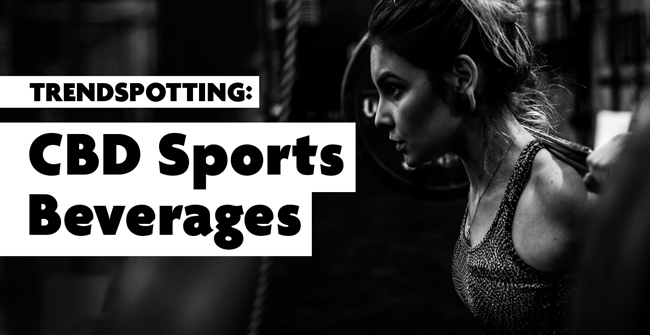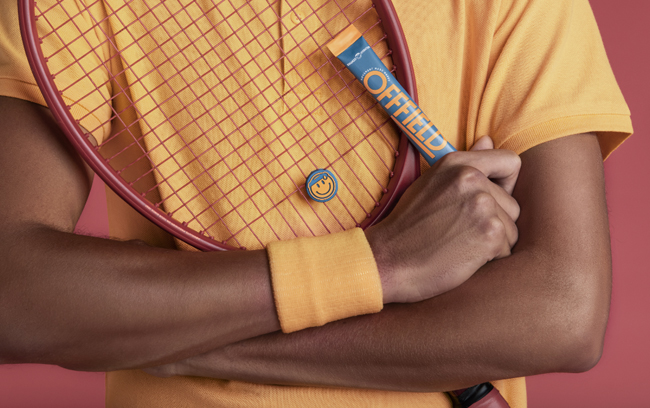The Concept: Sports Drinks Evolve
Sitting at the intersection of two consistently growing beverage categories, the addition of CBD to sports drinks has emerged as a rising trend over the past few years, offering functionality beyond the hydration benefits typically found in athletic performance beverages. While power players Gatorade, Powerade and BodyArmor continue to dominate store shelves and event sponsorships, CBD sports drinks are making headway online and in c-stores, and have captured the interest of both professional athletes and other active consumers through their suggested boost to both physical and mental health.
CBD has been of interest to athletes for several years, starting in more niche sports such as MMA before more recently spreading to other national sports leagues such as the MLB and PGA. The cannabinoid is said to reduce inflammation and anxiety and improve muscle recovery, and has been praised by some athletes as a safer alternative to over-the-counter pain medications. However, an article in journal Sports Medicine published in July stated that despite the potential “physiological, biochemical and psychological effects” of CBD on athletes, further studies of athlete populations are required to determine how CBD supports athletic performance.
According to Greg Dicum, CEO of cannabidiol consulting and product development firm CWI Consulting, the CBD sports beverage trend has emerged as two industries are taking increasing interest in CBD.
“I think we’re at a point right now where both the sports world is embracing CBD and the RTD beverage world is embracing CBD,” Dicum said. “So the obvious confluence of those two things is sports beverages and that’s starting to really make itself felt in the marketplace.”
According to Michael Flemmens, VP of Technical Business Development at CBD supplier SoRSE Technology, the company has begun to see increased interest in the production of CBD sports beverages after being an “overlooked category” for the last few years.
“When CBD first entered the marketplace, producers were adding it to gummies, brownies and cookies – and none of those form factors scream ‘health and wellness,’” he said. “Today, consumers are looking for CBD products that are healthier with less sugar, and a sports beverage featuring CBD, minerals, and electrolytes would be a great add to the marketplace.”
The general dosing range for CBD beverages is 15 to 40 mg, he said, as a higher dosage would significantly impact the price point. With the SoRSE emulsion, consumers should be able to feel the effects over the beverage within 10 to 20 minutes, which aligns with the intended pre- or post-workout use occasion brands use to market their products.
CBD-infused sports beverages were a new concept to consumers a few years ago, but as the category matures and more brands enter the marketplace, Dicum said he expects the space to evolve beyond CBD and THC to other cannabinoids, such as CBG, which offer additional functional benefits. Furthermore, as these brands gain traction and the federal government clarifies regulations on CBD-infused food and beverage products in the marketplace, Dicum expects larger strategics to quickly enter the CBD sports drink space, either through acquisitions or by launching their own products.
“I think, if we have clarity in the CBD rule by this time next year, that you would see a CBD Gatorade on the marketplace by the spring of 2022,” Dicum said. “It’s gonna be fast once the rules change because a lot of these companies are already formulating with them.”
The Market: Positioned For Growth
Despite potential challenges caused by a drop in retail foot traffic during the pandemic, both the sports drink and CBD categories continue to grow. According to research fim IRI, sales for both RTD and mix sports drinks market were up 11% year-over-year for the week ending July 12. The CBD industry continues to gain traction, and at least one report, by market intelligence firm Brightfield, expected it to be a $4.7 billion market by the end of 2020. The report also noted that CBD-infused beverages will see a 65% CAGR between 2020 and 2025, and stated that “extraordinary opportunities” exist in the CBD-infused beverage category, particularly for those positioned for “athletic endurance.”
While Dicum noted that there is a bimodal distribution of CBD consumers — millennials and Baby Boomers have adopted it for different use occasions — millennials are likely the target audience for CBD sports beverages. According to a study by the Brightfield Group, millennial cannabis users are three times more likely than baby boomers to use cannabis before or after a workout.
Lack of regulation by the FDA has kept CBD sports beverages off most conventional retail shelves, and though they have begun to carve out shelf space in c-stores in states such as Texas, Colorado and California, e-commerce remains an essential channel. According to Brighfield, e-commerce is the largest distribution channel for the CBD category as a whole, at 39% market share. E-commerce sales may be a particularly lucrative channel for CBD sports beverages, Dicum said, as consumers may be more willing to buy products like stick packs in bulk to align with their workout routines.
Investment in CBD beverages has gotten more difficult since the pandemic, given the economic climate and political uncertainty, Dicum said. However, CBD sports drinks may have an advantage: for the sports drink category in general, it’s been established that “there’s a clear pathway towards growing a brand and then exiting,” he said.
“Anybody who’s paying attention to both CBD and the beverages can see that this is a fruitful arena for potential exits,” he said.
However, venture capital may not always be the best choice for emerging CBD sports beverage brands. When first creating OFFFIELD, a new brand which makes a pre-workout CBD-infused powder blend, its co-founders Todd Hunter and Tony Fur witnessed some “negative backlash” after “oversaturation” in the cannabis investment space because “returns just weren’t matching investment,” Fur said.
“There were a lot of brands that were defaulting and going bankrupt, so we did not want to fall into that,” Fur said.
Rather than focus on securing VC funding, an angel investor in the brand advised them to focus more on brand building and establishing infrastructure needed for long-term success, allowing them to “run the business the way that we believe is the best for our brand and for our category,” Fur said.
The Products: New Brands Set the Tone
Several new brands have entered the CBD sports beverage space in recent months, progressing the trend by adding additional functional ingredients and offering products in different form factors to encourage online and grab-and-go sales.
OFFFIELD hopes to find success by “biochemically conquering the runners’ high” with its stick pack powder blend combining CBD and CBG, L-theanine, B12, magnesium, and electrolytes, intended to be dissolved in water and consumed 15 minutes before physical activity. By reducing anxiety and inflammation and supporting hydration, the products aim to promote this runners’ high by enabling anandamide, sometimes referred to as the “bliss molecule.” Hunter said the product format lends itself to both sustainable e-commerce shipping and seamless incorporation into consumers’ routines.
The brand is intended for the everyday athlete, according to Hunter, and is a reaction to a “generational change and shift,” particularly a generation who “thought they could win everything.”
“We’ve developed a brand that’s the counterpunch to that,” Hunter said. “OFFFIELD is really meant to be an invitation for people to re-invite recreation, movement and sport into their lives in ways that are fun and enjoyable.”
As many beverage brands have discovered in recent years, protein-added drinks are a simple way to extend an existing category’s reach into fitness and athletic performance use occasions and applications. After his experience creating caffeine-infused protein drinks as the founder of the brands WheyUp and FitWhey, Erik Rothchild sees CBD as the next functional ingredient that can complement protein; in his case, coming in the form of new shot product NanoGAINZ, which contains 80 calories, BCAAs, 20 mg of hemp extract and 20 g of protein (both whey and collagen-based) per 3 oz. bottle. The sugar-free line, available in Strawberry CocoLime and Dragon Fruit Prickly Lychee flavors, launched last month online at the company’s website and on Amazon, while Phoenix will serve as a test market for retail with local DSD distribution at gyms and specialty stores.
While protein powders that feature CBD have been on the rise, introducing a ready-to-drink liquid product, said Rothchild, a partner and VP of sales with the company, positions the trend within a strong grab-and-go proposition that appeals to a large but well-defined demographic.
“You can’t always make something for everyone,” he noted. “We wanted to be very specific with our audience.”
As new brands continue to enter the space, RTD performance beverage Defy has continued to grow since it launched last spring. Co-founded by NFL Hall of Famer Terrell Davis after discovering CBD as a solution to his chronic pain, the brand’s first launch was a three-SKU line of performance beverages infused with 25 mg of CBD, and it expanded its offerings with a zero sugar line this summer. While it has focused largely on ecommerce sales, the brand has made moves into retail, with new distribution in Texas and California, and is finalizing plans for international expansion. With the co-founders’ experience mostly in the sports world, the brand has also brought on beverage industry talent as it prepares for growth, adding two former IGNITE executives: Mike Holley has joined as COO, taking over for co-founder Megan Bushell as she moved into the CEO position, and Toby McBride is now president of beverage.
Having found success in CBD, the brand is now extending its reach, launching an alkaline water product later this year followed by a non-CBD performance drink in February, Bushell said. These new products come from “strategy and market demand,” as distributors look to fill holes left by acquisitions or strategic stakes in brands by Coke, Pepsi and KDP. While the brand will continue to put equal focus on its CBD product lines, Bushell said Defy is “not a CBD company” but instead “a performance and lifestyle company.”
While Bushell said sponsorship opportunities are not necessarily harder to secure for CBD products, she said it requires more due diligence than a typical sports drink to determine requirements of players and leagues. Defy was the first CBD sponsor in IndyCar history and also forged a sponsorship deal with professional tennis player John Isner last summer, the sport’s first CBD sponsorship. Other brands in the space who have leveraged sports sponsorships include Cleen:Craft, a Seattle-based brand offering hemp-infused sparkling waters flavored like CSDs, who has partnered with Stefan Frei, goalkeeper for Seattle Sounders FC; and performance beverage brand Kill Cliff, which partnered with CrossFit Games athletes for the launch of its CBD-infused line last year.
As the CBD sports beverage trend starts to gain momentum, Bushell said she believes the appeal of these beverages can even extend beyond the specific use case of athletic performance, particularly amid the pandemic.
“At this moment in time when everybody’s dealing not only with a physical health crisis, but also potentially a mental health crisis, people are looking for solutions, they are looking for holistic natural health and wellness solutions,” she said. “So not only from the sports and fitness focus, but also just from the general wellness focus, I think consumers are getting very excited about CBD.”


